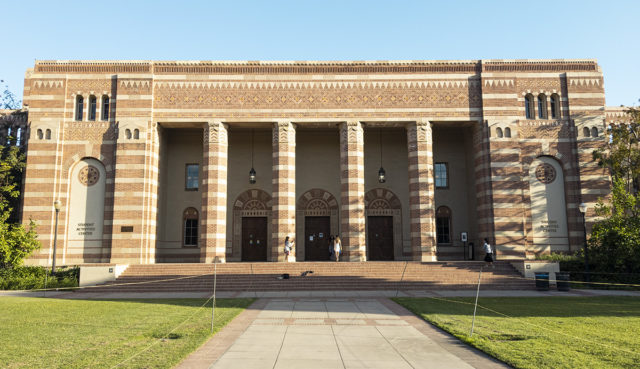This post was updated July 11 at 6:37 p.m.
Funding for the UCLA Graduate Writing Center was cut in half for the 2021-22 school year, leading to more than 30% of its student staff being laid off.
In 2020, the UCLA Student Fee Advisory Committee, which recommends the allocation of student fees to Chancellor Gene Block, reduced funding recommendations for the Graduate Writing Center for the 2021-2022 school year because of a lack of temporary funds available.
The Graduate Writing Center is an initiative run by the UCLA Graduate Students Association and currently employs 26 graduate students. The center schedules more than 3,000 appointments for peer revisions each year at no cost to graduate students and hosts various programs and workshops at the center.
The center receives most of its funding from the quarterly Graduate Writing Center referendum fee of $6.20 per graduate student. This fee creates permanent funding for the GWC, said Andrew McClure, the interim director of the UCLA Graduate Student Resource Center, in an emailed statement.
In addition to the referendum fee, the center also receives funding from the pool of student fees managed by the SFAC. SFAC is funded by a quarterly $376 Student Services Fee paid by both undergraduate and graduate students.
For the 2020-2021 academic year, the GWC had a $77,000 operating budget from SFAC, said Isabel Benvenuti, co-chair of the Graduate Writing Center Oversight Committee and the GSA vice president of academic affairs.
Christine Wilson, the SFAC advisor, said that GWC’s funding problems stem from the fact that funding for extracurricular programs must come from the Student Services Fee, and cannot come from some other sources like tuition or state fees.
McClure said in an emailed statement that although SFAC has expressed its support for graduate services, the Student Services Fee has not been increased to keep up with rising costs since 2018, which has led to a decrease in funding allocations.
From 2006 to 2017, SFAC increased its undergraduate student fee from $735 to $1,128 per year, according to data provided by the UCLA Office of Academic Planning and Budget. However, there has been no increase in the GWC programming allocation over the same period, although the student body has increased by more than 1,000 students since 2017, according to data provided by the UCLA Registrar’s Office.
Looking into the future, budget cuts will become more frequent because of decreasing funding, Benvenuti said.
“What’s important is what happens in the future,” Benvenuti said. “SFAC funding decisions are currently being made for ’22-’23. There will be cuts in the future if we don’t get the full amount, or if there isn’t some other source of funding.”
Benvenuti also said that if the GWC doesn’t get the funds it requested from SFAC for the 2022-2023 school year, the center could try to secure funds from other sources such as the different academic areas within the UCLA College or the Office of the Executive Vice Chancellor and Provost. GSA will also be advocating for funds for the GWC this coming year, she added.
Letty Treviño, the co-chair of the Graduate Writing Center Oversight Committee and the 2020-2021 GSA vice president of academic affairs, said she believes there should be a way to provide more stable funding for graduate programs.
“I think the question is, ‘Where can we get the necessary funding to provide the most basic of services to graduate students?'” Treviño said. “How do we ensure that funding isn’t funding that will just dry up in a few years?”

